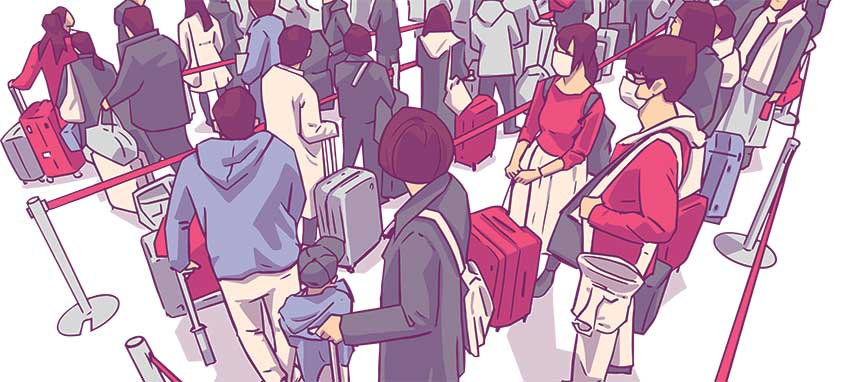5 takeaways from 35 days with a partial government shutdown
The longest government shutdown in U.S. history impacted everyone—even you. With 800,000 federal workers forced into furlough or working without pay for five weeks this past winter, airport security lines grew longer and national parks got dirtier—among other consequences.
If you missed a flight or had to navigate your way through an increase in delays and cancellations at the terminal this year, the good news is it’s (probably) not you. The bad news is it may happen again. We’ve rounded up five takeaways from the 35-day shutdown to help us all be more aware and better prepared in the future.
1. We learned who is essential.
Transportation Security Administration (TSA) agents and air traffic controllers are deemed essential by the government, so they have to continue to work without pay during a shutdown. That’s good for our safety and security. While waiting in line, however, we also learned that it is essential—or, beneficial, at least—to keep these employees happy (paid). After weeks reporting to work pro bono, more agents called in sick to work and failed to show up to shifts, raising the national rate of unscheduled absences in the TSA to 6.8 percent from last year’s 2.5 percent. Cue chaos and three-hour wait times at security.
We also learned how to tip TSA agents—never in cash and never more than $20, or it could be considered a bribe. The best bet is a gift card to a store or restaurant in the airport. Many airports set up donation bins for struggling employees. Being courteous helps, too.
We also learned that, in the long term, airline inspectors and trainers are important because the government eventually brought them back to work, reports The Wall Street Journal.
2. We learned what happens when no one is watching.
Also essential, though not by government standards, are park rangers who keep people from getting hurt and destroying public property—such as the vandals who killed trees during the shutdown in Southern California’s Joshua Tree National Park.
3. We learned that it takes a little time to get back into the swing of things.
If you’re feeling that your schedule is still too free, don’t panic! According to Jason Briefel, executive director of Senior Executives Association—a nonprofit professional association that advocates for the welfare of federal employees—the end of a government shutdown isn’t an immediate solution.
“The federal government isn’t a switch that can be turned on and off. It takes a lot of time to bring operations back up to full speed,” he said. “The resilience of the workforce is depleted by these types of situations.”
4. We learned that the price tag of a five-week partial government shutdown is $11 billion.
Yeah, ouch. Forbes reports that the shutdown has resulted in an estimated $11 billion hit to the economy. The meetings industry, for one, suffered due to the shutdown. Many felt the pain of some government agencies and associations cutting travel or canceling meetings. A slowdown in the Department of State issuing visas made international meetings on U.S. soil more challenging.
Roger Dow, president and CEO of United States Travel Association, put the price tag for lost economic activity at close to $100 million per day.
5. We learned that ‘shutdown’ belongs on the contingency list.
As event professionals, we have to be prepared for anything. In today’s political climate, we may have to create a plan B for when leadership can’t find a way to agree on a budget and the services we took for granted are no longer available. Add “shutdown” to the emergency preparedness checklist.
How to Entertain Yourself in Line
Enduring long screening lines can be tedious, regardless of the reason. Travel smart and savvy with these #MeetingProf-approved tips for making a good use of your time.
- Connect. Post in your LinkedIn group. Send a client a thank you email. Friend your trade-show buddies on Facebook. No wasted time.
- Thank TSA agents. They’ve probably had a long day.
- Ditch the line and sign up for Clear. The private security line brings you up to the front of the queue.
- Dump your inbox. Unsubscribe from all your junk emails, one by one. Bonus points, because it’s meditative!
- Whet your appetite! There are so many apps that promote productivity. Mark off your to-do list with Wanderlist. Expand your linguistic abilities with Duolingo. Follow a guided meditation for positivity on Calm.
- Consider alternate methods of travel—private jet passes, long haul charter buses and Skype.
- Get healthy! Calf raises, handbag bicep curls and a little stretch action goes a long way.
- Stay ahead of the competition. Head to SmartMeetings.com for the latest in industry news, tips and inspiration.




